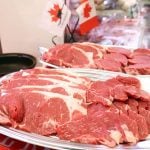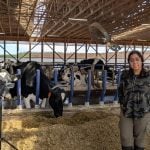Alberta and Saskatchewan feeder cattle prices were $2 to $5 lower on average last week due to rising barley prices and deteriorating pasture conditions. All weight categories were under pressure, with sharper slippage on shorter-keep replacements.
Alberta packers were buying fed cattle in the range of $202 to $204, but rising feed grain prices caused feedlot margins to narrow, setting a negative tone. Ranchers were moving cattle off grass in certain areas and will use last year’s feed reserves to maintain herds while hoping for timely rains. There is a hesitation to sell feeders this early in the season, but there were noticeable larger numbers of cow-calf pairs and individual cows coming on the market. Comments from the industry reflect that prices for cow-calf pairs in Alberta are down $500 to $800 from values earlier in spring.
Read Also

U.S. grains: Soy futures set 15-month high after China agrees to purchases
U.S. soybean futures reached a 15-month high on Thursday after President Donald Trump’s administration said top-importer China agreed to buy tens of millions of tons of American crops in the next few years as part of a trade truce.
Overall, prices are still near historical highs and the market was difficult to define, given the wide variation in quality and limited numbers.
In southern Alberta, Charolais-cross steers averaging 625 pounds sold for $305 while similar-quality cattle were dropping the gavel in the range of $310 to $320 in the Edmonton region. Conditions have been more favourable in Manitoba, where mixed steers averaging 600-630 lbs. were selling in the range of $320-$325. Timely rains, along with a stronger U.S. feeder market, were supportive in the eastern region of the Prairies.
Feed barley prices jumped $8 per tonne last week, reaching $225 per tonne delivered Lethbridge on Monday; feed wheat was also sharply higher, trading in the range of $220-$225 per tonne in southern Alberta. Western Canada is contending with historically tight barley stocks and the upcoming wheat crop will be of higher quality, so this upward trend in feed grain prices will likely continue.
— Jerry Klassen is a commodity market analyst in Winnipeg and maintains an interest in the family feedlot in southern Alberta. He writes an in-depth biweekly commentary, Canadian Feedlot and Cattle Market Analysis, for feedlot operators in Canada. He can be reached by email at [email protected] for questions or comments.












